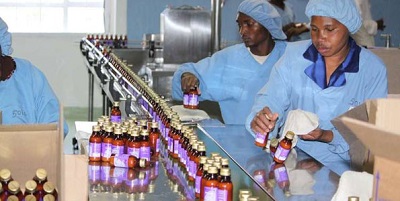Govt must support pharmaceutical companies to produce vaccines locally

If nothing at all, the outbreak of the novel coronavirus disease has taught the Ghanaian economy a lot of lessons.
What started as health crisis in late 2019 in Wuhan in China, has been transformed, into a global economic and development crisis, shattering the global economy.
What are the lessons? The COVID-19, among others, has taught the country to put measures in place to be self-sufficient in all that she needs especially in the area of vaccine manufacturing.
Also, the COVID-19, pandemic has demonstrated that a country cannot depend on the other in times of emergencies.
Thus, it is imperative for the country to strengthen the health sector and the pharmaceutical companies to be able to produce majority of the drugs the country needs locally.
Even though, the country, Ghana can boast of a lot of medical research institutes of international repute and a lot of pharmaceutical companies, most of the drugs the country needs are imported, making the country susceptible to shocks in the global supply of medicines.
Mention can be made of the Noguchi Memorial Research Institute at the University of Ghana and other research institutes at the various universities in the country.
Also, the country has a lot of experts and professors in the field of medicine and pharmacy, which can develop medicines and vaccines locally, which the country can export to raise a lot of foreign exchange.
Worryingly, Ghana has to depend on other countries to procure vaccines and the benevolence of other governments for additional COVID-19 vaccines to vaccinate the citizens in a bid to protect lives and fight the disease.
At the moment, the country has not been able to vaccinate even half of the population due to the difficulty in accessing COVID-19 vaccines.
Per a BBC story published in the Friday, October 1, 2021, edition of the Ghanaian Times, it said Ghana was not included in the African countries which had met the global target of vaccinating more than ten percent of their populations against COVID-19 by the end of September, 2021.
Fifteen out of the 54 African countries have met the target. The countries are Seychelles, Mauritius, Morocco, Tunisia, Eswatini, Cape Verde, Botswana, Comoros, Zimbabwe, Equatorial Guinea, South Africa, Mauritania, Lesotho and Rwanda.
Figures from the Ghana Health Service (GHS) indicate that as of September 26, 2021, the country has recorded a total of 47, 998 cases of COVID-19, with 120,542 recoveries, and severe cases of 124.
Those in critical conditions stand at 43, the dead at 1,156 and active cases of 3,088.
In terms of vaccination, according to the GHS, as of September 26, 2021, a total of 1,653, 442 doses have been administered and a total of 786, 899 have been fully vaccinated.
On the global level, as of October 4, 2021 a total 235,810,070 cases of coronavirus have been recorded with 4,817,796 deaths and recoveries of 212,693,277.
As of now, every country in the world has a taste of the bite of the coronavirus pandemic.
Encouragingly, the government has announced plans for COVID-19 vaccines to be produced locally.
Consequently, it has committed a seed funding of $25 million for the local production of COVID-19 vaccines, the President Nana Addo Dankwa Akufo-Addo, announced recently.
The production of the vaccines will be coordinated by the yet-to-be established National Vaccine Institute, whose mandates will include establishing local vaccine manufacturing plant, deepening research and development for vaccines.
The President observed that the local production of the vaccine has become necessary following a global shortage in recent times.
“The global shortage of vaccines means that we must develop our capacity to produce our own vaccines domestically and reduce our dependence on foreign supplies,” the President said.
“We must be self-sufficient in this regard… and prepare ourselves better to deal with any such occurrences in the future,” he added.
While the government is trying to establish the National Vaccine Institute, local pharmaceutical companies, which have proven track record of producing drugs can be supported to go into vaccine production.
One of such local companies which has the capacity and can be supported to go into vaccine production is COA Research and Manufacturing Company Limited.
COA Research and Manufacturing Company Limited, located at Wusorkrom in the Abura Asebu Kwamankesi District of the Central Region produces well-being products.
The company is to construct a new plant to meet growing demand for the company’s products.
In an interaction recently with the Deputy Managing Director, Nana Ofosuhene Apenteng Awere, when some members of the Institute for Financial and Economic Journalists paid a visit to the company, he said the company was willing to go into vaccine production if government approached the company to do so.
He said the government had not approached the company to that effect, saying government had initiated a move and set up a team to help the country go into the production of vaccines locally.
“Let’s wait and see and what the team will come out with,” he said.
Nana Awere said his outfit had secured a large tract of land for the expansion drive of the company.
He said the move formed part of the expansion drive of the company and the growing demand for COA mixture both locally and internationally.
Nana Awere said the objective of COA Research and Manufacturing Company Limited produces COA mixture, a herbal product which boosts and strengthens the immune system was to come out with herbal medicines to help promote the health of the citizens to boost productivity in the country.
“Our vision is to become the leading manufacturer of herbal medicine in West Africa,” he said, adding that the construction of the ultra-modern plant was expected to start next year.
According to Nana Awere, the company, which currently employed 120 staff, used only fresh herbal leaves and products, which were sourced locally from its farms and other suppliers.
The Deputy Managing Director said the company was WHO compliant and produced under strict hygienic conditions, adding that the company was implementing International Standard Organisation 9001-2015 quality management system.
Concluding, I believe the country has the capacity and the human resource to produce vaccines locally. There is no need to re-invent the wheel as local pharmaceutical companies can be supported to enable the country produce vaccines locally.
By Kingsley Asare
Writer’s email/ WhatsApp of author:
gbetomenyo81@gmail.com(0246943864)














